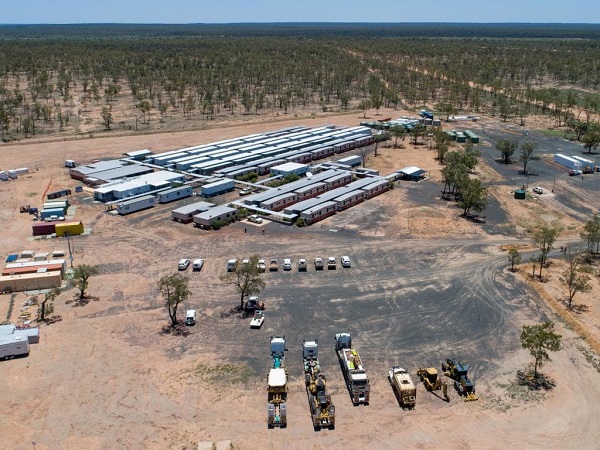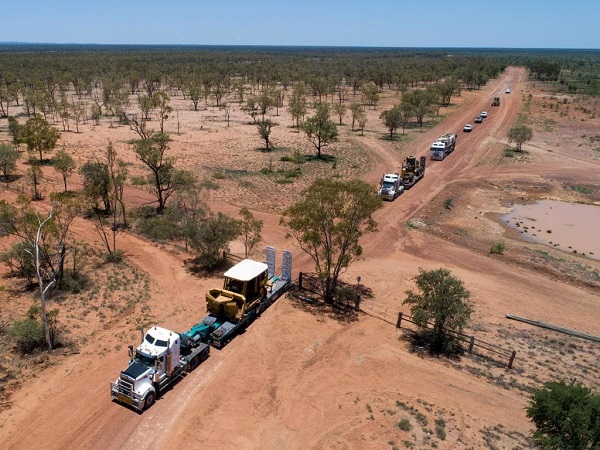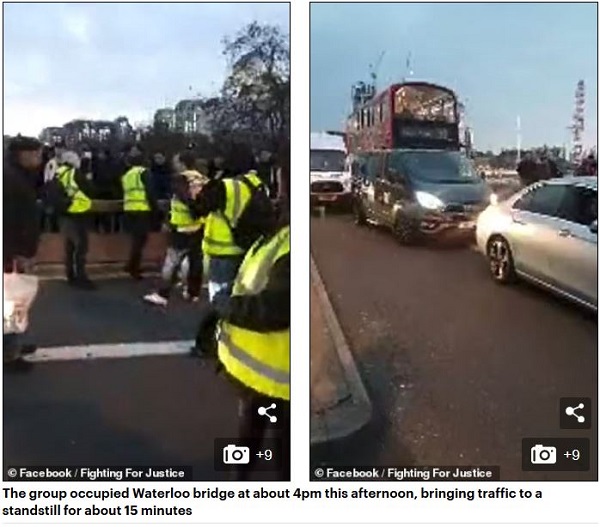1. Adani poised to start, but…
If you don’t think Adani is serious about starting work on the Carmichael Mine in the Galilee basin, take a look at this:

Serious heavy equipment is being move to the site:

Yet we have Adani’s Carmichael mine approval delayed by another two months.
The Palaszczuk Labor government has commissioned an independent review into the company’s environmental management plans – a process which is expected to take at least two months.
- Adani – which announced in late November it would self-fund the thermal coal mine and rail project – has been told the Department of Environment has now commissioned an independent scientific plan review into the company’s management plan for the black-throated finch – a process which is expected to take another two months.
The new review, by the National Environmental Science Program’s threatened species recovery hub, could delay the beginning of construction on the mine until early next year, if not longer.
It seems to me highly likely that the Queensland government has decided to kill the project. The review comes on top of the CSIRO’s finding that Adani’s key water management plan is flawed and used some unverified data in a review commissioned by the Commonwealth government.
2. Brexit Is Destroying Britain’s Constitution

I couldn’t resist the photograph. It may reflect Theresa May’s state of mind, but hardly what she thinks of the Queen!
The author, Garvan Walshe, thinks the political system in Britain has become broken since the emergence of the Scottish National Party made working majorities a thing of the past:
- Without a working majority, party leaders must pay attention to their hard-liners, or, as some Conservative Party members have been known to call them, “swivel-eyed loons.”
In practice, though, Britain now has a situation where nothing can be agreed in parliament, and that probably includes a second referendum. So the chances a really quite high that Britain will tumble out with no deal. Walshe reminds people:
- The Bank of England estimated that such a “disorderly” Brexit would cause unemployment to almost double, inflation to rise to more than 6 percent, house prices to fall by 30 percent, and the pound to fall below parity with the euro.
Update: I meant to add that civil unrest on the part of the Brexiteers has already begun. See British yellow vest protests spread as pro-Brexit campaigners block traffic by occupying Tower, Westminster and Waterloo bridges in central London:

This could get ugly.
3. Artificial intelligence in predictive policing
Somewhere among the 113 unfinished posts that now clutter the innards of Climate Plus (they are not all mine!) there is a draft post on Cambridge Analytica. The bottom line is that they developed an algorithm which, after analysing 150 likes an individual makes on Facebook, knows more about you than you do yourself. Hence it knows before you do that you are going to buy a new car, for example.
The power of AI is now being harnessed in policing. In Britain according to the New Scientist:
- Police in the UK want to predict serious violent crime using artificial intelligence, New Scientist can reveal. The idea is that individuals flagged by the system will be offered interventions, such as counselling, to avert potential criminal behaviour.
However, one of the world’s leading data science institutes has expressed serious concerns about the project after seeing a redacted version of the proposals.
The system, called the National Data Analytics Solution (NDAS), uses a combination of AI and statistics to try to assess the risk of someone committing or becoming a victim of gun or knife crime, as well as the likelihood of someone falling victim to modern slavery.
Ethical concerns have been expressed, even more so about the application of AI for policing elsewhere:
- Earlier this year, Human Rights Watch criticised the Chinese authorities for allegedly using predictive policing to pre-emptively detain people in the province of Xinjiang.
On TV last night we saw that Palestinians were being locked up in Israel on the basis of views expressed on social media. That could make those people very angry.
New Scientist has another article Biased policing is made worse by errors in pre-crime algorithms.
If the main story is pay-walled, Gizmodo has a story about the NS story at British Cops Are Building An AI That Flags People For Crimes That Haven’t Happened Yet.
See also Britain Is Developing an AI-Powered Predictive Policing System.


I meant to add I meant to add that civil unrest on the part of the Brexiteers has already begun. See British yellow vest protests spread as pro-Brexit campaigners block traffic by occupying Tower, Westminster and Waterloo bridges in central London:
This could get ugly.
3 is by far the most concerning issue this roundup.
Thats happening all over the world right now, it should be the main objective of the media to fight it.
That should make all of us very angry.
Jumpy, I would tend to agree with you.
I think the technology used in the British predictive policing would be helpful if it helped the police to identify who they should be watching and monitoring. Not sure how much further anyone should go, but I think there should be discussion and consultation over the issue, and perhaps laws to prevent abuse by the authorities.
Brian
The moves to stifle that ” discussion ” is maturing between Silicon Valley and the ” authorities “. Any Laws passed will only advance the control agenda. We’ve 1984ed ourselves.
Free Speech is a chronically endangered species. And its the species that sustains all the others.
Best tell your Grandkids to brace themselves about that before Climate Change, the negative feedback timeline is way faster historically.
For a really informed read on the use of “big data” read “Everybody Lies” by Seth Stephens Davidowitz, It talks about how “big data” can be enormously beneficial as well as how it can be misused in the way Brian talks about in the post.
Part of the problem is that the algorithms developed by big data are not always transparent and may simply mean that big data has learned to use the bias of key people. For example, Afro-Americans may be more likely to be found guilty of a second crime because of the human bias of the judges that decide who is guilty. Feed sentencing/conviction results into big data and it picks up bias and puts it into the algorithm even if the data used does not include race. (Read that the algorithm resulted that people called Tyrone were given heavier sentences because of a perceived risk of repeat offence because Tyrone was a more common name for black males.
‘
Just heard that the tsunami crashing onto Indonesia was caused by an eruption of Anak Krakatau the child of Krakatoa.
Bl**ding hell.
I can recommend Simon Winchester’s book on the Krakatoa eruption in the 19th Century. He studied geology at Uni, and it shows. The book reads like a thriller.
Ambi: An eruptions which triggered an underwater landslide which caused the tsunami without any warning earthquake.
There was a very damaging tsunami caused by an underwater landslide some years ago.
Big data works by throwing a lot of data at a computer to see what correlates with some issue. The data might include names, where people live, age income marital status etc.
Groote Eylandt had impressive murder rate so the correlation may have picked me as a high risk potential murderer because I lived on Groote Eylandt, owned spears, woomeras, screw drivers and an axe. In terms of murder the main problem was Aboriginal men but I could still be caught because the analysis may have been set up to avoid being overtly racist. However, Aboriginal and non-Aboriginal men could have been largely separated by the town they lived in and whether they had given names starting with “N”. (Men’s names usually started with “N”, women’s with “D”.) Would have solved my problem but still tough for a white teacher called Noel living in one of the Aboriginal communities.
My understanding is that the US started using big data to decide the “risk of re-defending” sentencing component to avoid the problem with judge bias against Afro-Americans. However, big data got around the no racist requirement by finding a whole range of tags, like being called Tyrone, that were more common amongst Afro-Americans. (Big data would have been given a raft of data for those who did and did not repeat offend, or, even worse, been given past court decisions.)
My take is that big data should not be used to help determine guilt, influence sentencing, decide who gets bank loans, insurance etc but it may be OK to determine where the effort should go for things like preventing terrorist attacks, reducing re-offending etc.
Big data can also help identify people at risk of certain diseases, identify the start of epidemics by doing things like looking at surges in key Google health questions and….
“Everybody Lies” also talks about how Google search can also challenge claims. One example involved claims that the election of Obama signaled the end of racism in the US. The surge in searches for things like “nigger jokes” after the Obama election didn’t support these claims.
John
I see it as an extension of collectivist thinking.
No nett good for individuals can come from it.
For your entertainment.

The second hit of a search for “collectivist thinking”.
More holiday reading from the same search.
Jumpy:
Research using big data is like science. It can be a power for good, evil or both and you often can’t tell which it is going to be before it is started.
For me terrorist research that identifies a potential “terrorist” before she kills me may be good for me but bad for an innocent person who suffers because she has been “identified.”
Jumpy:
Research using big data is like science. It can be a power for good, evil or both and you often can’t tell which it is going to be before it is started.
For me terrorist research that identifies a potential “terrorist” before she kills me may be good for me but bad for an innocent person who suffers because she has been “identified.”
Not sure what the bias you show in the blogosphere hints at.
Once Rupert Murdoch dies, his children will sell a lot of his media properties.
What will be some of the general effects on both local and national and international media of Rupert Murdoch’s death?
Will any of his children try to sway national elections, e.g. here or in UK or in USA?
Was he ever influential in that arena?
How much tax does News Int owe?
How is Sky going in China?
If newspapers are going down the drain financially, who would buy those assets?
Ambi, hard to say. Maybe the dead tree version will go, but some of the online ventures seem here to stay. Newscorp apparently have found the paywall works for them.
Thank G for the ABC, The Guardian, which doesn’t need to make a profit, and The New Daily, which is owned by Australian industry super funds.
Jeff Bezos I gather owns the Washington Post, and they and the NYT are doing well in days of Trump and fake news.
So, again, who knows? However, I do think the Oz has generated talking points and set the agenda in many cases. And when we had money going to school halls it was easy to put one negative story from NSW on the front page every day, even they constituted a bit over one per cent of projects.
Murdaoch will do the same to Shorten. The question is, will he have the same credibility he once had?
It is hard to tell the extent to which Murdoch is a leader or a follower. His influence is enhanced if he picks winners to support and is therefore seen as powerful.
Having said that I gave up on the Murdoch press when there were to many articles where the headlines said something that was not supported by the article.
Got trapped tonight watching The Man with the Golden Gun with Mark, a James Bond movie made in 1974. Made me think of the 1970s, which were amazing in many ways.
Sex was fun, before the modern feminists taught us it was something else.
Not sure I would have watched the film in the 1970s. Was more into European films, some made behind the iron curtain, which was the interest that brought me and my now wife together.
Ambi. Brian, Notice how the Nine Network is much less of a bogey man for Australian Leftsts now it’s no longer owned by the Packers?
People need a big figure to focus hatred on,
Thanks, Brian, John and Scott
Maybe I have mistaken a couple of things.
A current trend should never be extrapolated too far into the future. Fairfax may eventually find a new way to prosper.
Yes, News Limited’s influence can be overstated.
I too find many useful stories and opinions in The Australian, though some friends abhor the paper with vitriol. Which makes me agree with you, Scott. Many citizens harbour vehement hatred against supposedly “evil” figureheads.
This goes way beyond what is called “tall poppy syndrome”, supposedly an aspect of Australian “egalitarianism”. I think it has more in common with religious fervour: rejection of The Devil and all His Works.
No, really.
The hatred and vitriol are very strong.
Yes, many of these people will profess to be secular, some are militant atheists. But they talk like “witch burners” when it comes to Murdoch, Packer; Menzies, Fraser in 1975, …..
I’m not sure why.
This seems appropriate here.
That’s a seriously good article, zoot.
It details how the political influence works, but when it comes to voting, I suspect it is a demographic blind alley. Remember the only the LNP owns is the 55+ group. The rural base of the National Party used to be the farmers. Someone might like to check it out, but from memory, the last I heard was that there were only 85,000 farms left in Oz.